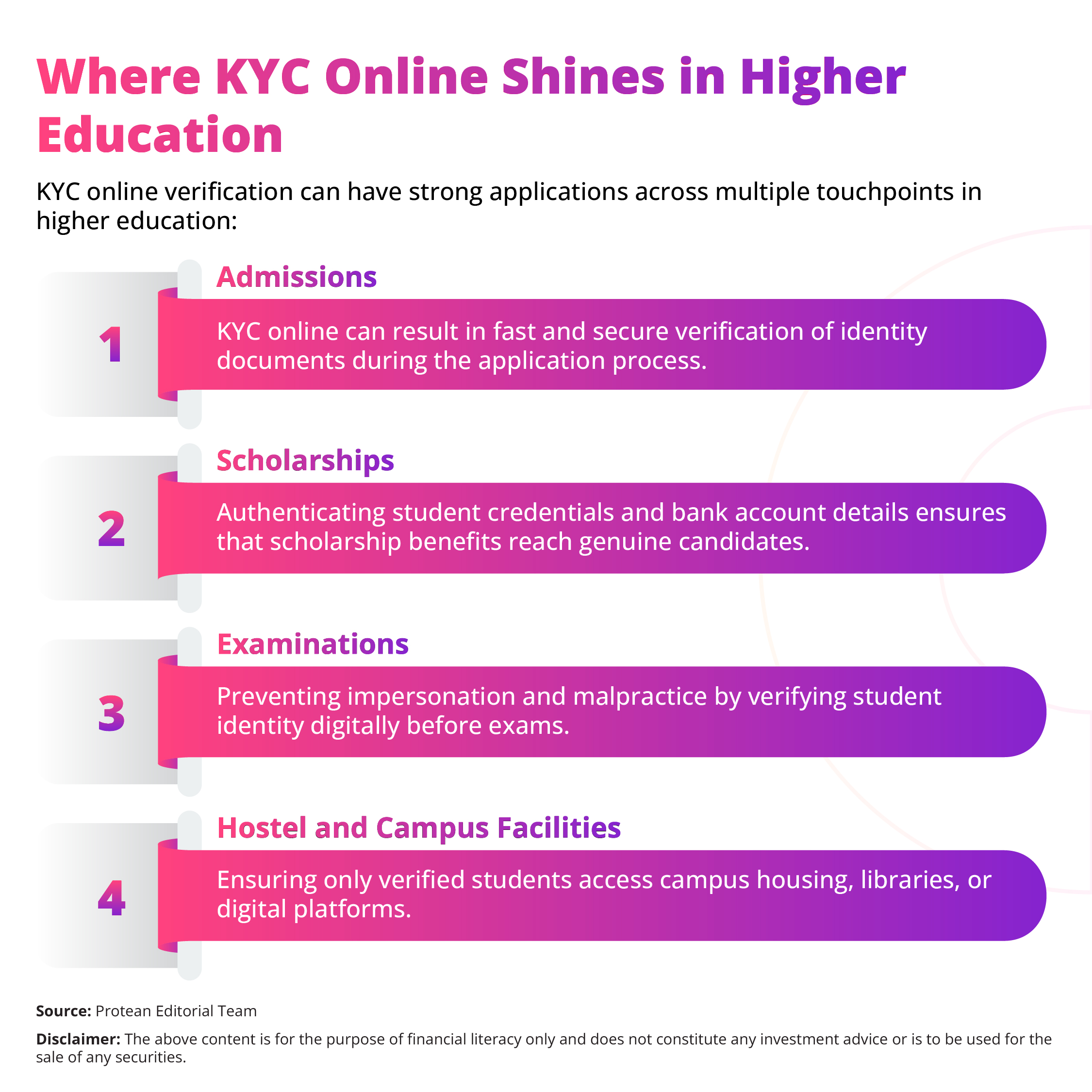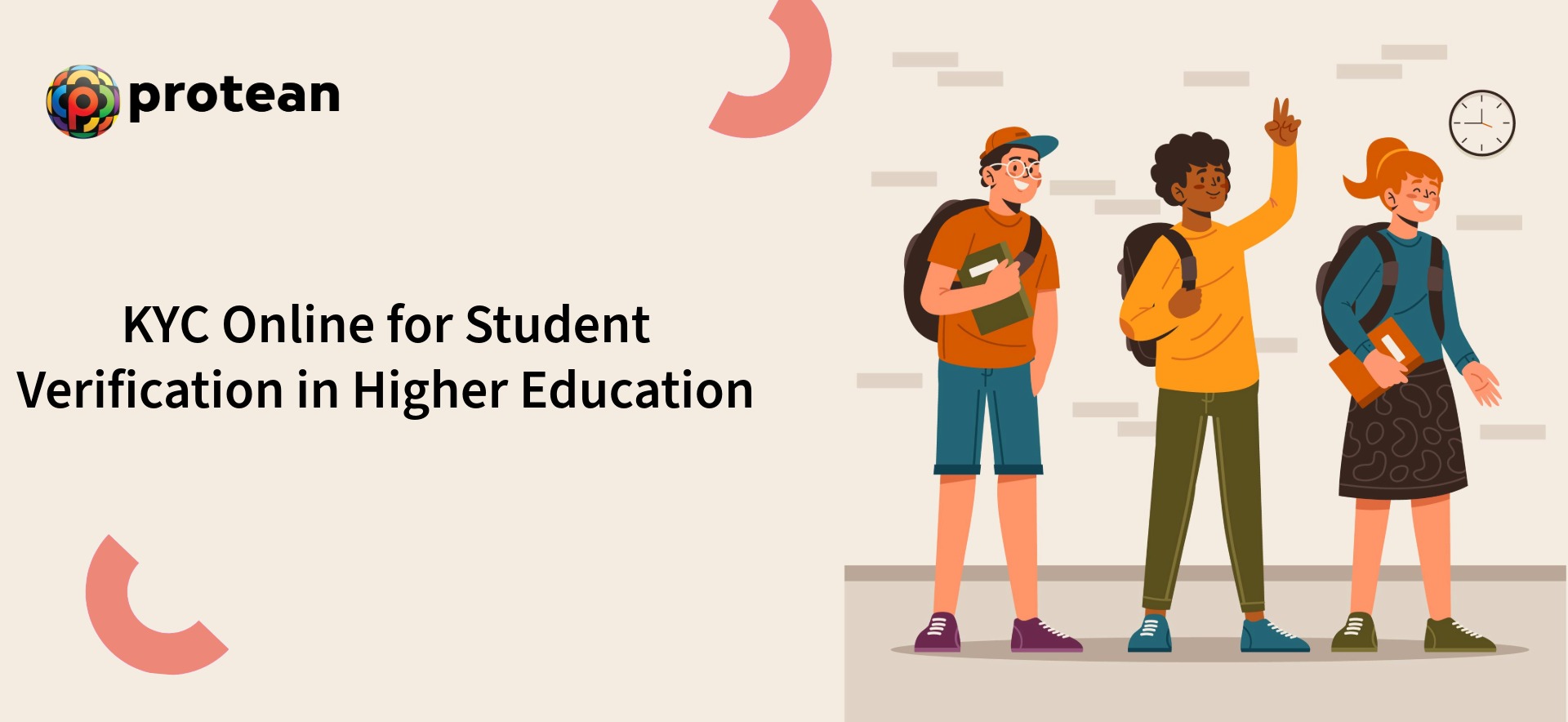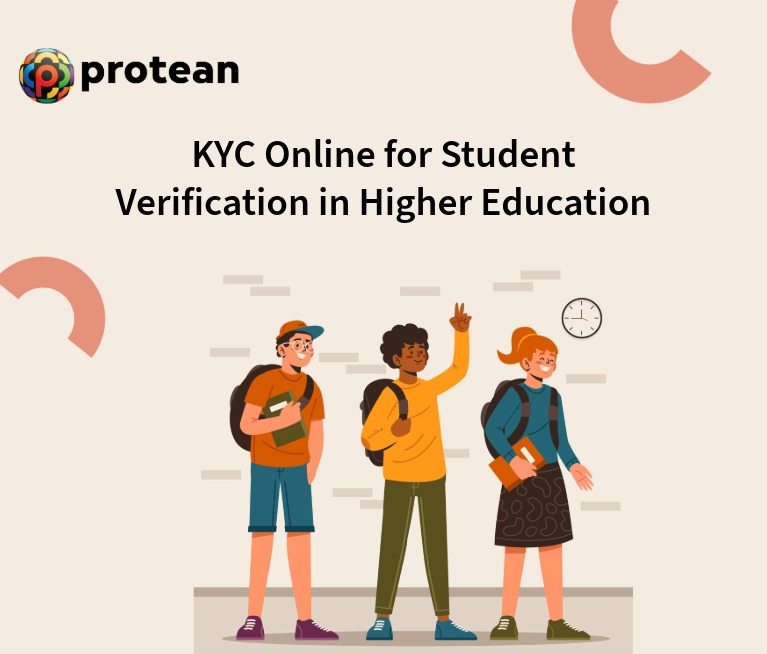The KYC online verification process can streamline student verification for educational institutions.
Institutions are now turning to KYC online verification to make the admission and onboarding process seamless, secure, and efficient.
With service providers such as Protean eGov Technologies Ltd., KYC online services are enhancing trust and compliance standards across sectors, with growing potential applications in higher education.
The Traditional KYC Challenge in Education
Here are the main challenges that educational institutions can face with traditional KYC:
- Physical submission of documents: Students have to provide Aadhaar, PAN, passport, or other ID proofs in physical form, often in multiple photocopies.
- Frequent in-person visits: Verification can require students to visit college offices or administrative centers, sometimes involving travel to distant campuses.
- Manual scrutiny by staff: Administrative teams can check documents manually, which consumes time and creates opportunities for human errors.
- Delays due to incomplete records: Missing information, mismatched details, or outdated ID proofs often slow down the process.
- Error-prone process: Issues like misspelled names, unclear photocopies, or inconsistent information require re-verification, adding to delays.
- Risk of loss or tampering: Physical records could be misplaced, damaged, or even tampered with, creating vulnerabilities for both students and institutions.
- Operational bottlenecks: During admission peaks, thousands of applications can lead to heavy backlogs, forcing staff to spend weeks on verification.
- Reduced academic focus: Excessive time spent on verification divert resources away from core academic and administrative planning.
- Fraudulent admissions: Lack of real-time verification can make it possible for some applicants to use forged or stolen documents to gain admission.
- Inadequate for the digital era: These outdated methods fail to meet modern expectations of speed, efficiency, and security in higher education.
What is KYC Online Verification?
KYC online verification is the digital process. Institutions can use it to validate an individual’s identity. For this, they use secure and government-approved systems.
KYC online can enable institutions to authenticate an individual’s (a student’s) details directly against databases such as UIDAI for Aadhaar. KYC online can ensure accurate and tamper-proof verification through Aadhaar-based authentication, OTP-based checks, or biometric confirmation.
Licensed providers such as Protean eGov Technologies integrate seamlessly with institutional systems to offer real-time verification.
This method can have the following advantages:
- It can eliminate the need for physical documentation
- Reduce the risk of forgery
- Accelerate the verification process
The Reserve Bank of India (RBI) and the Securities and Exchange Board of India (SEBI) have already mandated eKYC in financial services. Similarly, UGC has directed the educational institutions to adopt an online KYC model for identity checks.
How KYC Online Transforms Student Verification
Higher education institutions can gain multiple benefits by adopting a KYC online verification process.
1. Efficiency and Speed
Adopting KYC online verification can reduce the time taken to verify student identities.
Traditionally taking days or weeks with physical documents, online KYC can now complete verification within minutes.
2. Accuracy and Reliability
Since KYC online verification relies on official databases like UIDAI, the chances of human errors are minimised. Institutions can be confident that the student’s identity is genuine.
3. Scalability During Admissions
Manual verification might create backlogs. However, the KYC online process can allow parallel processing. This can enable institutions to manage large volumes efficiently.
4. Fraud Prevention
Identity theft and fake admissions are genuine concerns in the education sector.
KYC online can offer a secure authentication mechanism. Also, KYC online verification can ensure that fraudulent applicants are filtered out.
5. Cost Savings for Institutions
Institutions can reduce their paperwork, need for physical infrastructure, and administrative involvement.
6. Better Student Experience
Today’s students expect fast and digital services. Universities can provide a smooth and user-friendly experience, strengthening their brand and reputation by offering KYC online.

Conclusion
With India on the path of digital transformation, the KYC online verification has become an emerging cornerstone. Its efficiency has potential to support this shift.
It is also reshaping how institutions operate by:
- Reducing manual bottlenecks
- Ensuring secure authentication
- Improving the overall student journey
Get support from licensed providers like Protean eGov Technologies Ltd now to accelerate the efficiency of your education business.
Frequently Asked Questions (FAQs)
What is KYC online verification in education?
KYC online verification is a digital process. Here, the student identity details are authenticated against government-approved databases like UIDAI. It helps institutions confirm the legitimacy of a student’s identity in a secure and quick manner.
How does KYC online benefit students?
Students save time, avoid repeated paperwork, and experience a smoother admission process. They can also access scholarships and services without delays caused by manual verification.
Is KYC online verification secure?
Yes. KYC online uses secure APIs, OTPs, and biometric checks linked with government databases. Licensed providers like Protean eGov Technologies ensure compliance with data protection and privacy standards.
Can institutions of all sizes adopt KYC online?
Yes. Whether a large university or a smaller college, institutions can integrate KYC online with their existing systems. It is scalable, cost-effective, and adaptable to different operational needs.

